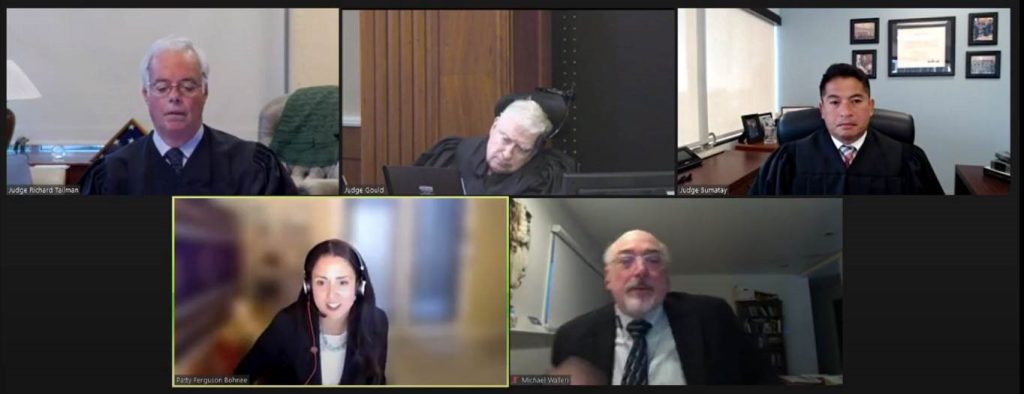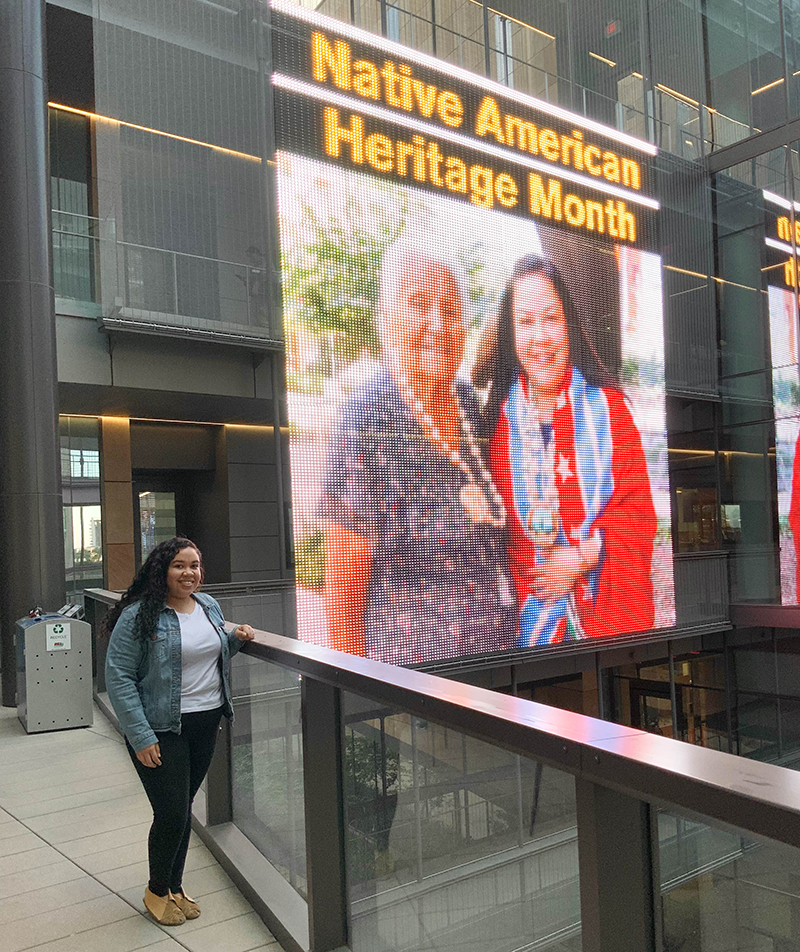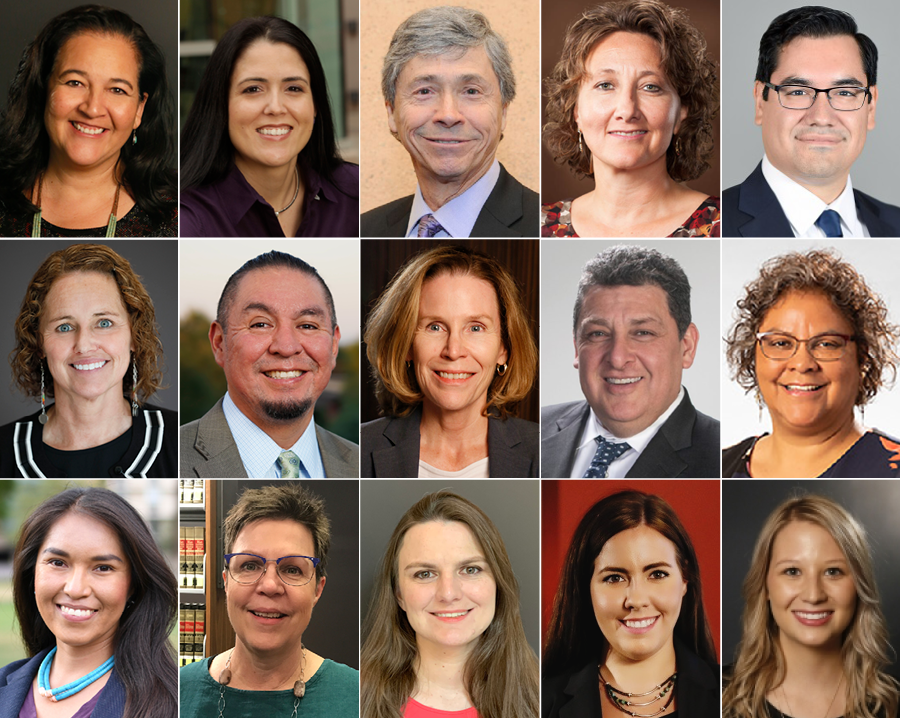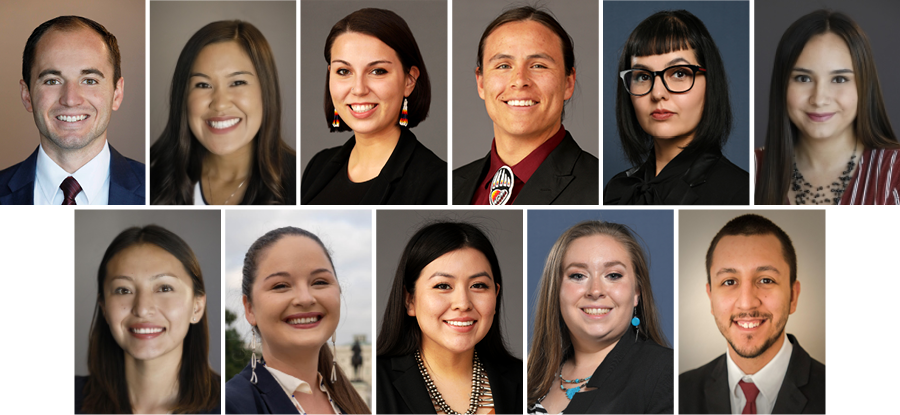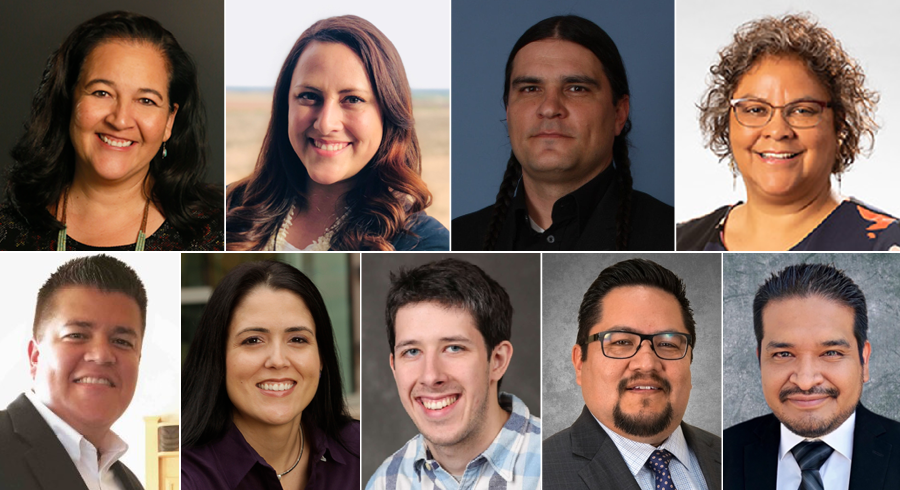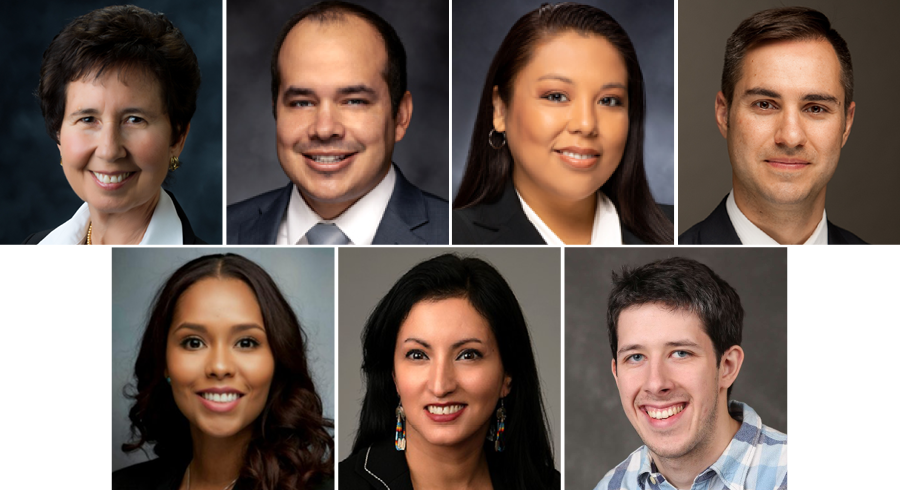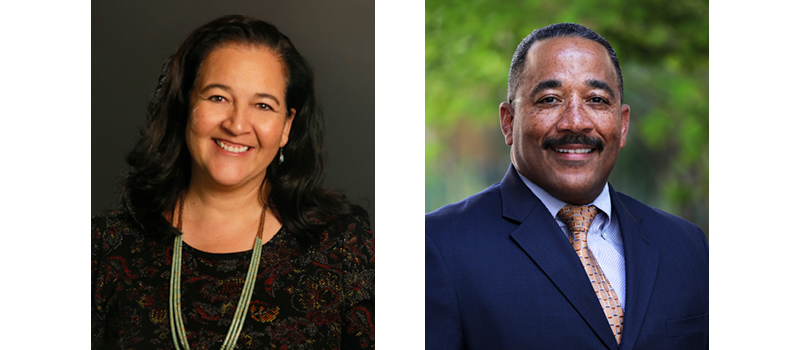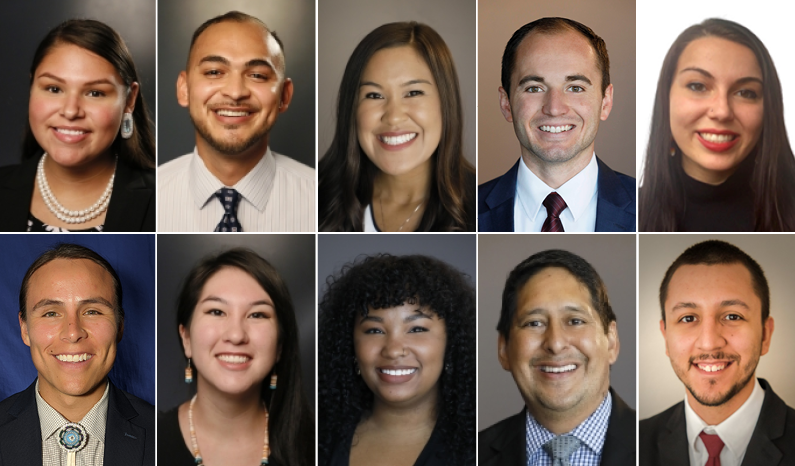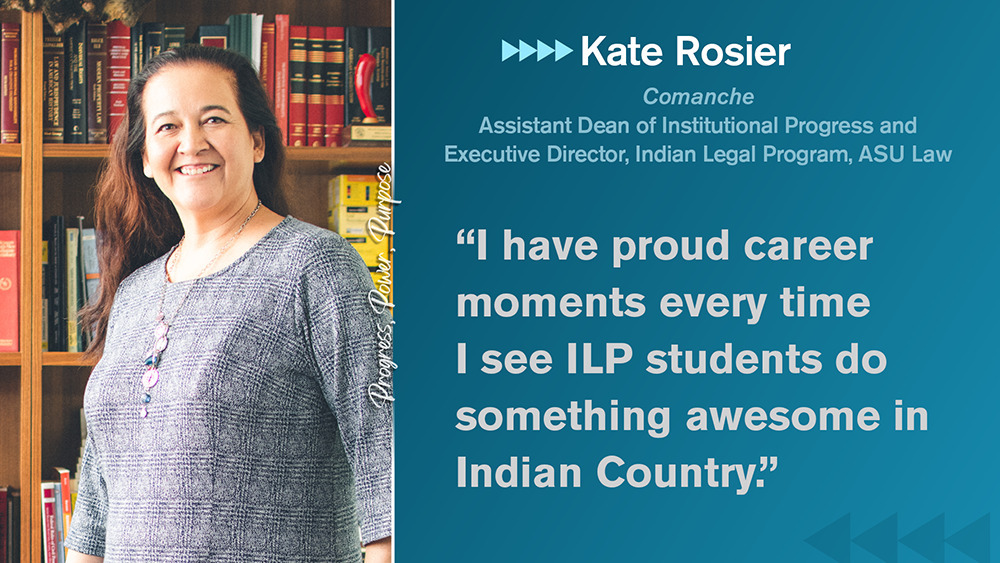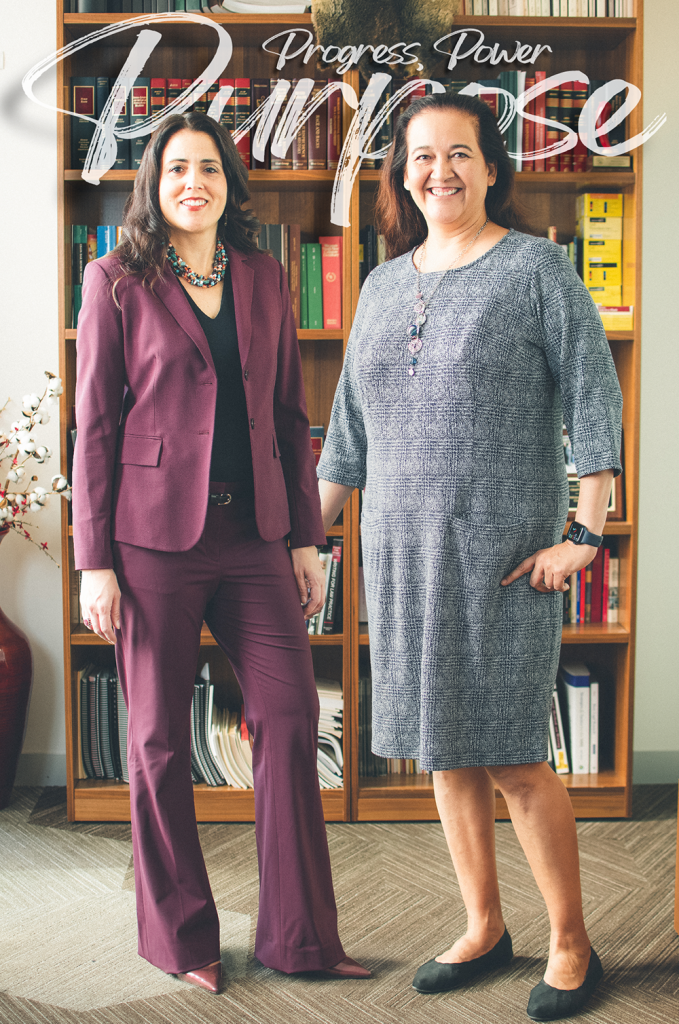In celebrating “Women’s History Month,” we turned to some of the women of the ILP to shed light on Native women legal professionals and advocates in this Progress, Power, Purpose series. There’s something special to be said about ILP Director Kate Rosier who was recently appointed to Assistant Dean of Institutional Progress, the name is so fitting. Fostering talent and shaping the future one conversation at a time is this Comanche woman’s talent—ask any ILP alum and current student. Her most recent and proven work is in the Native American Pipeline to Law Initiative, which is comprised of three dedicated partners. In its seventh year, the Native American Pipeline to Law team is proud to host Pipeline to Law Online Sessions this summer.
For most of the ILP Family who address her as Katie Bear or Momma Bear Kate, Dean Rosier has also been addressed as Professor this year. For the first time in her career, she is co-teaching an undergraduate course, Law 394: Law School Foundations, with Assistant Dean Ray English at ASU Law. Providing so many students with opportunities to achieve greatness is her bread and butter!
Q: What does your current position entail?
A: I’m the official Momma Bear of the ILP. I help to recruit and retain students and make sure the students have a nice experience while in law school. I also help with grant writing, development, alumni relations, partnerships, programming and communications for the program.
Q: Were you always interested in this kind of work?
A: No. After I passed the bar, I started working for Gila River’s Law office. In 2000, I was contacted by my former law professor and (then) Dean of ASU Law Trish White and Professor Tsosie about joining the ILP team. I had a business background and had worked with incoming students at University of Utah so it seemed like a good fit. Thinking back on it now, I kind of grew up in this position.
Q: What advice do you have for Native American women who want to work in this area?
A: Working as a law school administrator has been awesome for me and my family. I am able to stay connected to the law, help diversify the profession while balancing the demands of family. I think this might be a dream job.
Q: What is your proudest career moment?
A: I have proud career moments every time I see ILP students do something awesome in Indian Country. I see them as babies and then they graduate and help change the world. Very cool.
Q: Who are three Native American women law professionals and/or advocates who should be on our radar right now?
A: Who can name just 3!?
- I’m inspired by Patty and Stacy. They are smart, professional, fun and always wanting to give back to Indian Country.
- I’m in awe of our female attorneys leading tribal legal teams: Jennifer Giff and Theresa Rosier (Salt River), Debra Gee (Chickasaw), Diandra Benally (Fort McDowell), Doreen McPaul and Kim Dutcher (Navajo) and Ann Marie Bledsoe Downes (Deputy Solicitor for Indian Affairs).
- Kristin Theis-Alvarez (Berkeley Admissions/Pipeline to law team member) Kristin is now the dean of admissions at Berkeley law. She has been working hard at Berkeley, the Native American Pathways to Law Program, Graduate Horizons, and with LSAC to help diversify the profession. She is smart, confident, stylish and full of sass.
- Rodina Cave Parnall (Director of PLSI) Rodina had big shoes to fill taking over for Heidi Nesbit. She didn’t try to be Heidi. She stepped in and made the role her own. She has been great with the students and tried to think of creative new ways to support future lawyers before, after and during law school. I appreciate the patience she has with students and her willingness to think about what each student needs.
- The many students and young grads of ILP. I know I recruited them but WOW! They are so smart and talented. I can’t wait to see what they will do next. The future is bright.
- I’m also inspired by all the lawyer moms balancing everything well. The law is a tough field and they are getting it done while having kids, parents, partners, pets and extended family to keep happy. Bravo!
Q: In your career, did you ever feel like the lone Native American voice in the room? How did you overcome those adversities? For that girl/woman who is finding her rhythm and trying to carve out a space to thrive, what advice would you give her?
A: Remember your law degree and bar license is just as valuable as theirs. Do not let people make you feel less than.
Q: Favorite law school memory:
A: Attending PLSI before the start of law school was my favorite time. It was so powerful to be surrounded by native students on the same journey. I met my future sister-in-law and best friend at the program. WE had fun, worked hard and learned so much. I’ll always be grateful for my time there. PS – The class of 1995 was the best class of all time.
Review Kate’s accolades:
- “ASU Law announces new leadership positions” in ASU News article.
- Kate received the Council on Legal Education Opportunity Inc.’s EDGE Award for exhibiting “Education, Diversity and Greater Equality in the legal profession” in November 2018.
